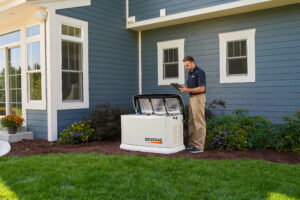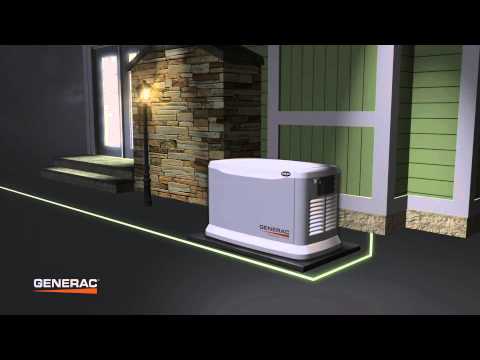For homeowners in Rochester, Syracuse, and Buffalo, a reliable standby generator is more than a convenience. It is protection against power outages caused by winter storms, equipment failures, or unexpected grid issues. At Home Power Systems, we help families across upstate New York stay prepared with whole-home generator solutions that add safety, comfort, and long-term value to your property.
Below, we’ve answered the most common generator FAQs to help you better understand how these systems work, what they cost, and how to keep them running reliably for years to come.
1. What size generator do I need for my home?
Every homeowner’s requirement is different. Your generator will be sized based on the electrical load it will be carrying. The size of your house does not matter unless we are sizing for a whole house transfer, nor does the size of the electrical service feeding your home. It all comes down to what you want to run during an outage. The only real answer is to have Home Power Systems provide a complimentary site survey to recommend a proper solution to fit your specific requirements.
2. How much does it cost to install a generator?
The cost to install a whole-house generator can vary significantly. Generator size, fuel type, location, and whether there's a need need for electrical upgrades can also influence the final price.
3. How loud is the generator?
The air-cooled generators are all about 66db at 20 feet. Remember, Generac has been manufacturing generators for 60 years; they are designed for residential neighborhoods.
Selected noises with decibel levels and maximum daily exposure to avoid the risk of noise-related hearing loss. At less than 85 decibels, sounds aren't considered a risk.
Source: World Health Organization
4. Do I need to have my gas meter upgraded?
MAYBE! As part of your initial site survey, your Power Advisor will complete a Gas Inventory Report. Once the model of your present gas meter is recorded, your Power Advisor will take an inventory of all of the gas-fueled appliances. In most cases, if a gas meter upgrade is required by your local gas utility it is a simple process at a minimal cost to the homeowner.
5. Do I need a building permit?
Most likely. As part of a turnkey install, Home Power Systems will coordinate with your local building department to determine how local building code is interpreted in your jurisdiction. In many cases, we have already completed a number of installations in your town or city and are already familiar with what your Building Inspector requires. We will also secure all needed permits, HOA approvals and attend variance meetings on your behalf if needed – truly everything is included in your quote from start to finish.
6. How much service does a generator need once it is installed?
Generators need routine care to stay dependable. That includes oil changes, filter replacements, battery checks, and full system testing. Home Power Systems offers service plans to properly maintain your generator and help it perform at its best year after year.

7. How long will my new generator last?
When properly maintained, most standby generators last between 15 and 30 years. Usage, local weather, and installation quality all affect lifespan. If your current unit is aging or frequently needs repairs, it may be time to start thinking about generator replacement.
8. How much does it cost a month to run the generator when it runs for 10 minutes a week?
Depending on the price of natural gas, it shouldn’t cost more than $5 or $10 per month to run the unit in exercise mode. During a power outage, under 50% load expect to pay around $20-$40/day for gas usage. A lot cheaper than a hotel room or spoiled food!
9. Why am I getting so many diverse answers on what is needed to install a generator?
It’s called a “spectrum of competence”. Most “generator installers” are deficient in experience, training, and commitment to the industry. They are looking for the sale and installation only. As the old saying goes, “you get what you pay for”. This is true for the generator industry as well. If you are looking for the cheapest price, please do not call Home Power Systems. If you are looking for the best value for the money, long-term commitment, trained and certified technicians, and the peace of mind that your generator will start during the most important time for you and your family, HPS is the only authorized dealer for you.
10. Do you have generators and parts in stock?
Yes, Home Power Systems is one of the largest stocking dealers in the Northeast. We do keep stock of most generators and transfer switches. As for part availability, there is no waiting if your generator needs to be repaired – we stock parts at both our Rochester and Syracuse facilities and on each service vehicle. This means if there is an issue with your generator, we can repair it, and there is no lead time for ordering the part you need because we already have it in stock.
11. What fuel supply do I need to run one of your generators?
Generac and Kohler and home standby generators can be fueled by either Natural Gas or Propane vapor. Most portable generators are designed to be fueled by gasoline only.
12. Can you install the generator for me?
We can. Home Power Systems provides expert installation services for homeowners in Rochester, Syracuse, Buffalo, and the surrounding areas. Our licensed technicians handle everything from permitting to final testing, ensuring your system is safe, code-compliant, and fully operational.

13. Who will be completing the work?
At Home Power Systems, you are dealing with ONE company. You are working with a team that strictly focuses on only standby power generation. From the initial site survey and design of your standby solution to the review process by our experienced staff, to the work completed on the day of the installation, Home Power Systems has the unique ability to provide all aspects of your generator installation from start to finish. In the event that you are a propane customer, because code regulations state that only licensed LP vendors can install propane regulators and set tanks, we will coordinate with your local provider and manage their scope of work on-site.
14. How big and how heavy are these generators?
Most air-cooled residential generators are around 350-550lbs.
15. Does my generator come with a battery?
No automatic home standby generators ship with a battery. Home Power Systems recommends a Group 26 battery for both Generac and Kohler air-cooled standby generators. This is just one of the items included with a turnkey installation.
16. Do I have to pay Sales Tax on my installation?
Because a standby generator is a capital improvement, there is no sales tax charged to the customer. In the State of New York, a property owner who hires a contractor to perform work that qualifies as a capital improvement will be furnished with a Form ST-124, Certificate of Capital Improvement.
17. What are the benefits of automatic transfer switches for generators?
Automatic transfer switches constantly monitor your home’s utility power. If an outage occurs, they instantly switch to generator power and then back again once the grid is restored. This keeps your home running without any manual steps. You do not even need to be home when the power goes out.

18. How do I schedule service on my home generator?
It’s easy. Call us today, and we will help you schedule a service visit. You may also opt to use schedule an appointment online. Whether you need regular maintenance or a system checkup, our team is ready to help keep your generator in peak condition.
19. Can a generator get wet?
Generators are designed for outdoor use, but they should never sit in standing water or be exposed to direct rainfall without proper cover or enclosures. Water exposure can damage internal components or pose safety risks. If your unit has been affected by water, reach out for generator repair. Our team also handles emergency generator repair in severe cases.
20. How do you start a generator?
Standby generators usually start automatically when your home loses power. For portable models, you will follow steps like opening the fuel line, engaging the choke, and using a manual or electric starter. Always consult your owner's manual for model-specific instructions.
21. How long can you run a generator?
Most standby generators can run for 24 to 72 hours continuously, depending on the fuel type and tank size. With proper servicing and adequate fuel supply, they can operate even longer during extended outages. Portable units have shorter running times and require more frequent refueling.
22. Are there financing options available for home generator installation?
We offer flexible financing options for New York homeowners who want backup power without a large upfront investment. The application process is secure and fast, and most customers receive a response in just a few minutes. At Home Power Systems, we'll help make installing your new home generator as financially convenient as possible.
Conclusion
For homeowners across Rochester, Buffalo, and Syracuse, a standby generator offers more than backup power. It provides peace of mind during winter storms, protects against spoiled food or flooded basements, and adds long-term value to your property.
Home Power Systems is here to help you find the right solution. Whether you need a new installation, expert maintenance, or repairs on your existing system, our team is ready to guide you with clear answers and dependable service. We are here so you are never left in the dark.
Looking for a quote or more information? Schedule an appointment today with Home Power Systems, here.





